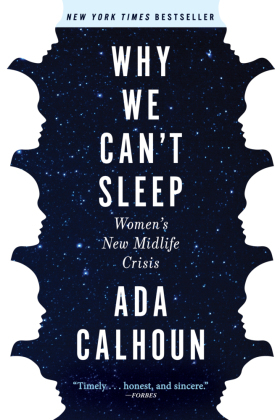Why We Can't Sleep - Women's New Midlife Crisis
| Verlag | Grove Press |
| Auflage | 2021 |
| Seiten | 304 |
| Format | 17,1 x 2,0 x 21,1 cm |
| Gewicht | 261 g |
| Artikeltyp | Englisches Buch |
| EAN | 9780802148575 |
| Bestell-Nr | 80214857EA |
A generation-defining exploration of the new midlife crisis facing Gen X women and the unique circumstances that have brought them to this point, Why We Can't Sleep is a lively successor to Passages by Gail Sheehy and The Defining Decade by Meg Jay
A generation-defining exploration of the new midlife crisis facing Gen X women and the unique circumstances that have brought them to this point, Why We Can't Sleep is a lively successor to Passages by Gail Sheehy and The Defining Decade by Meg Jay.
When Ada Calhoun found herself in the throes of a midlife crisis, she thought that she had no right to complain. She was married with children and a good career. So why did she feel miserable? And why did it seem that other Generation X women were miserable, too?
Calhoun decided to find some answers. She looked into housing costs, HR trends, credit card debt averages, and divorce data. At every turn, she saw a pattern: sandwiched between the Boomers and the Millennials, Gen X women were facing new problems as they entered middle age, problems that were being largely overlooked.
Speaking with women across America about their experiences as the generation raised to "have it all ," Calhoun found that most were exhausted, terrified about money, under-employed, and overwhelmed. Instead of being heard, they were told instead to lean in, take "me-time," or make a chore chart to get their lives and homes in order.
In Why We Can't Sleep, Calhoun opens up the cultural and political contexts of Gen X's predicament and offers solutions for how to pull oneself out of the abyss-and keep the next generation of women from falling in. The result is reassuring, empowering, and essential reading for all middle-aged women, and anyone who hopes to understand them.
Leseprobe:
An acquaintance told me she'd been having a rough time, working three jobs as a single mother since her husband left her. Determined to cheer up her family, she planned a weekend trip. After working a long week, she started packing at ten p.m., figuring she could catch a few hours of sleep before their five a.m. departure. She asked her eleven-year-old son to start gathering his stuff; he didn't move. She asked again. Nothing.
"If you don't help," she told him, "I'm going to smash your iPad."
He still didn't move.
As if possessed, she grabbed a metal hammer and whacked the iPad to pieces.
When she told me this, I thought of how many parents I know who have fantasized or threatened this very thing, and here she'd actually done it. I laughed.
"Yeah, my friends think it's a hilarious story too," she said, "but in reality, it was dark and awful." Her first thought as she stood over the broken glass: "I have to find a good thera pist...right...now."
Since turning forty a couple of years ago, I've become obsessed by women my age and their-our-struggles with money, relationships, work, and existential despair.
Looking for more women to talk to for this book, I called my friend Tara, a successful reporter a few years older than me who grew up in Kansas City. Divorced about a decade ago, she has three mostly-grown children and lives on a quiet, leafy street in Washington, D.C., with her boyfriend. They recently adopted a rescue dog.
"Hey," I said, happy to have caught her on a rare break from her demanding job, "do you know anyone having a midlife crisis I could talk to?"
The phone was silent.
Finally, she said, "I'm trying to think of any woman I know who's not."

